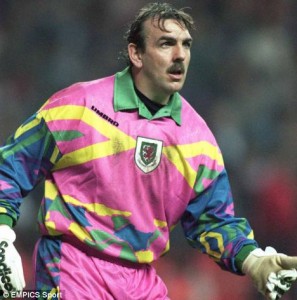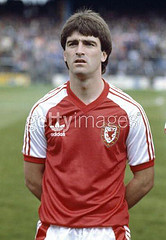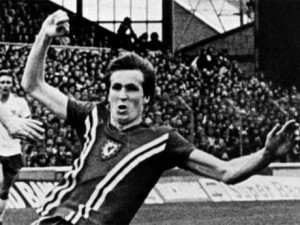 It was three years after watching my first City match that I finally saw Wales play for the first time in October 1966 and, in a portent of things to come, they found themselves being robbed of victory by an 87th minute equaliser from Scotland’s Dennis Law who slid in on a waterlogged pitch to knock the ball in, almost certainly, with his hand to secure a 1-1 draw for his country. By this time, John Charles and Ivor Allchurch’s international days were over and so I never got to see two men who were serious contenders for the title of Wales’ best ever player represent their country. However, thinking back, I’ve seen some excellent individual performances in the red Wales shirt and, with a couple of internationals upcoming, I thought it would be a good idea to pick a team of the best players I’ve seen play for my country.
It was three years after watching my first City match that I finally saw Wales play for the first time in October 1966 and, in a portent of things to come, they found themselves being robbed of victory by an 87th minute equaliser from Scotland’s Dennis Law who slid in on a waterlogged pitch to knock the ball in, almost certainly, with his hand to secure a 1-1 draw for his country. By this time, John Charles and Ivor Allchurch’s international days were over and so I never got to see two men who were serious contenders for the title of Wales’ best ever player represent their country. However, thinking back, I’ve seen some excellent individual performances in the red Wales shirt and, with a couple of internationals upcoming, I thought it would be a good idea to pick a team of the best players I’ve seen play for my country.
I do this, fully aware of the fact that I’m probably forgetting about some very strong candidates for inclusion, but, in an effort to avoid this happening I’ve come up with three candidates for every position in my team which will be set up in a Dave Jones officially approved 4-4-2 formation – I doubt it if there will be many (if any!) who agree with my selections, but here goes.
Goalkeeper
The nominations are Gary Sprake, Neville Southall and Wayne Hennessey.
Easiest selection of the lot to start with. It just has to be the man who would be vying for the goalkeeper’s jersey with Gordon Banks and Pat Jennings if this team was my best British eleven. I’m biased of course, but if there was a better keeper around in the early to mid 80’s than Neville Southall, then I didn’t see him. Actually, what interest there is in the selection for this position lies more with who would be my substitute keeper. Gary “Careless Hands” Sprake dropped more than his fair share of clangers during his career, but he was first choice at, arguably, the best team in the country for quite some time – on balance though, I’d go for Hennessey who is now fulfilling his youthful promise and, although, he never receives the publicity that someone like Joe Hart gets, I’d say he is a definite candidate now for the title of best current British keeper.
Right back
The nominations are Peter Rodrigues, Rod Thomas and Mark Delaney.
Peter Rodrigues was my first ever City “hero”, mainly because he was a master of the now lost art of slide tackling, but also because I remember him being pushed up front after an injury in the days when there were no substitutes and scoring a goal in a 3-2 win over Rotherham. Rod Thomas was a capable and composed player who could also play at left back and I remember that he did a good job at centreback at Cardiff as he brought some order and class to what was a shambolic back four when he signed for us at the age of 30 in 1977. However my selection is Mark Delaney – injury meant that we probably never saw how good he could have been, but his speed, defensive qualities and ability going forward marked him out as an excellent modern day full back. The best Welsh performance I’ve seen is the 2-1 win over Italy in 2002 where, rather than rely on hwyl and commitment, we beat a fine side in a game of football and one of the main reasons for that was the havoc that Delaney and Simon Davies caused down Italy’s left flank – on that performance alone, Delaney deserves to be in there.
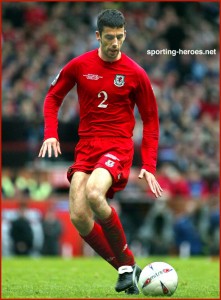
Mark Delaney - just thirty six caps, but it could have been around one hundred without the injuries that blighted and, eventually, ended his career.
Centreback
The nominations are Mike England, Terry Hennessey and Eric Young.
Hennessey (who is a cousin of the current Welsh keeper) was a fine player who captained his country in the late 60’s when he was a regular in the Forest team that were pipped for the First Division title by Manchester United in 1967 – probably better known as a midfield player, Hennessey’s versatility possibly counts against him when it comes to selection in this team. While I think Wales have had more accomplished footballers at centre back, Eric Young (who now works as a horse whisperer according to Wikipedia) was an effective performer at International level. The clear winner for me though is Mike England. The former Wales manager was an imposing and dominating centre half who could also play effectively up front – this gives the clue that England was no mug with the ball at his feet either. He was the complete centre half and many regarded him as someone who might well have ended up with a World Cup winner’s medal if his country of birth had matched his surname.
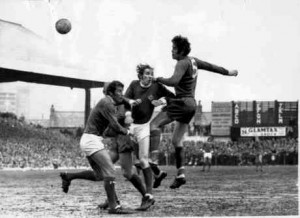
Mike England, who was a part of City's defence in the 1975/76 promotion season, towers above his Northern Irish opponents in a game played at the old Vetch Field in 1970.
Centreback
The nominations are Leighton Phillips, Kevin Ratcliffe and Danny Gabbidon.
Again, quite an easy selection here. Although I’ve always thought he was never fully appreciated by City fans, Leighton Phillips was a stylish performer who settled into the centre back role after beginning his career as a midfield player. Not the biggest of players, Phillips relied on anticipation and clean tackling to make him an effective member of a good Aston Villa outfit’s defence and spent much of his career in the old First Division. Another player whose career suffered because of injuries, Gabbidon also wasn’t that big for a centre back, but had a great leap which meant that there weren’t too many strikers who got the better of him in the air, while his pace and reading of the game meant he had very few weaknesses when he was in his pomp. However, Kevin Ratcliffe also had all of these qualities and more – he was a leader who captained Everton to success at home and abroad and in the years before an injury which blunted his effectiveness somewhat, was, probably, as good an out and out defender as any in the British game.
Left back
The nominations are Malcom Page, Joey Jones and Pat Van Den Hauwe.
Page only gets a nomination because of a late decision to use Gareth Bale in another position. Solid and efficient rather than spectacular and enterprising, Page was still good enough to be a regular in the most successful Welsh team I’ve seen (the 1976 European Championship quarter finalists), but the real competition for the number three shirt rests between the other two nominees. They were quite similar in a lot of ways in that they were no strangers to red and yellow cards and were very much defenders first and foremost, so neither of them were too effective going forward. If anything, I’d say Van Den Hauwe, who won domestic and European honours with Everton, had the more successful career and was, arguably. the better player, but Joey Jones was passionate about playing for Wales and, although the Belgian born Van Den Hauwe’s commitment to the Welsh cause was never really in doubt, he just shades this selection for me.
N.B. It’s been, correctly, pointed out to me that I should have considered Mark Bowen at left back (told you there’d be some I’d forget about!). Bowen would be a strong contender to get into the team, but I think that, just as I selected Joey Jones over Pat Van Den Hauwe for his his attitude, the same thing would apply here.
Right midfield
The nominations are David Phillips, Simon Davies and Gareth Bale.
Phillips was an unfussy, steady, hard working performer who gave Wales twelve years service in amassing sixty two caps. Versatile enough to be used in a variety of positions, he had a hammer of a shot in his right foot as well as more skill than he tended to be given credit for. As for Simon Davis, like so many good Welsh players he has been hit by injuries that have left him not quite the player he once was, but around the time of our tilt at qualifying for Euro 2004, he was playing superbly – people remember his goal and overall display against Italy, but there was also a great goal to get Wales a draw in a friendly in Croatia and for a while when Manchester United were sniffing around, he was the hottest young property in the British game. Davies would have got in the team, but for my decision to include Gareth Bale in this position – Bale showed that he can be just as effective on the right in the games with Australia and Montenegro and, as a genuine World Class talent, has to be included in this team.
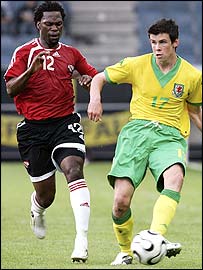
A sixteen year old Gareth Bale in action on his Wales debut against Trinidad and Tobago in May 2006.
Central midfield (holding)
The candidates are John Mahoney, Peter Nicholas and Barry Horne.
Despite never really doing much that could be considered eye catching, Nicholas racked up seventy two caps in a thirteen year international career during which his ball winning skills and defensive covering did much to give more naturally talented team mates an opportunity to show what they were capable of. Horne performed a similar role in later, less successful, Welsh sides, but, because both players were essentially defensive in nature, they lose out to someone who I would guess is the most surprising choice in my team. John Mahoney was a tireless workhorse in the midfield’s of Stoke City, Middlesbrough and Swansea City at First Division level, but, although his work rate was first class as he, invariably, covered every blade of grass during a game, he could play as well. Mahoney only scored once in his international career, but it was such an important goal as he showed the instincts of the striker he was for a short while at the beginning of his career, to coolly dink the ball over the keeper as Wales became the first foreign international team ever to win at Hungary’s Nep Stadium on their way to qualification for the Quarter Finals of the 1976 European Championships.
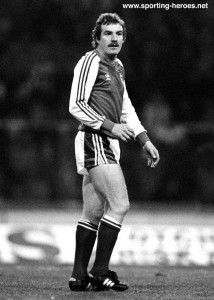
The largely unheralded John Mahoney would have had no problems whatsoever adjusting to the modern game.
Central midfield (attacking)
The nominations are Terry Yorath, Aaron Ramsey and Gary Speed.
Actually, I daresay Yorath may have been better suited to a more defensive role, but finds himself in this category because Wales have rather struggled in this position down the years – Yorath’s hard tackling and leadership qualities tend to be remembered more now, but he wasn’t a bad passer of the ball either. If I do another one of these selections in five or ten years time, then I fully expect Aaron Ramsey to be in the team, such are the qualities that mark him down as, potentially, the best Wales midfield player in decades, but with eighty five caps in fourteen years exemplary services to his country as a player, Gary Speed simply demands inclusion. Until his legs started to go towards the end of his career, with the result that he couldn’t get forward as much as he used to, it was hard to spot a weakness in Speed’s game – good technically, easily able to cope with the physical side of the game, great in the air and an accomplished finisher who captained many of the teams he represented, he had virtually everything.
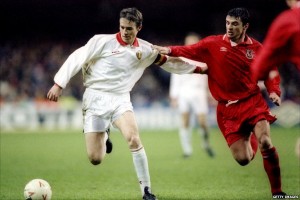
A young Gary Speed in action against Belgium in 1993 - the England manager of that time said he was the one non English British player he would have in his team if he could.
Left midfield
The nominations are Leighton James, Mickey Thomas and Ryan Giggs.
Although he wasn’t as good as he thought he was, Leighton James could be unplayable if it was one of his days. Two such occasions in a Welsh shirt came at Wrexham as he tore European Champions Czechoslovakia to pieces in 1977 and when he played a leading role in England’s 4-1 defeat in 1980, while he’ll always be remembered as the man whose goal gave Wales their only win so far at Wembley. Mickey Thomas was a busy and effective performer who I suppose is better known now for his off field misdemeanour’s than what he did on a football pitch, but he was good enough to play at the top level for nearly ten years. James and Thomas are quite strong candidates, but when they are up against the most successful footballer of the Premiership era, they have no chance – Ryan Giggs might not have hit his Manchester United heights too often in a Wales shirt and he did have an annoying habit of going missing for friendly matches, but, as the best all round Welsh footballer I’ve seen, he has to be included.
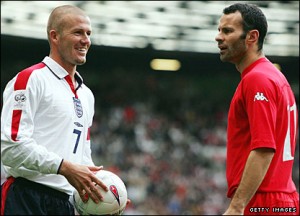
Two icons of the modern game - I know which one I'd want in my team (clue, he isn't wearing white!).
Striker (target man)
The nominations are Ron Davies, John Toshack and Mark Hughes.
My main memory of Ron Davies now is of him scoring all four goals for Southampton in a 4-1 win at Old Trafford in 1969 and there being a recognition from media and spectators that they were watching a real craftsman in action. If Mike England might have made the 1966 World Cup winning team, then Davies was, probably, good enough for England’s 1970 squad if he had qualified to play for them. Despite his height, Davies had a certain elegance to his game, I’m not sure the same could be said about John Toshack, but he definitely could be effective (as, for example, he was in scoring all of Wales’ goals in a 3-0 win over Scotland in 1979). My selection though is Mark Hughes who could make a success of the target man role more through his sheer body strength than any great aerial ability. Hughes was also good enough to have dropped a bit deeper and act as an auxiliary midfield player if required and his fine all round technique and abrasive approach makes him one of the finest Welsh players of the late twentieth century.
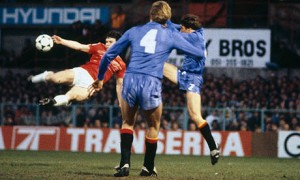
Although it happened five years after his debut for Manchester United, this is the moment when Mark Hughes really announced himself on the world stage - his superb goal in Wales' 3-0 win over Spain in 1985.
Striker (poacher)
The nominations are Ian Rush, Dean Saunders and Craig Bellamy.
There’s some strong competition for this place with Saunders being one of a group of top class players from the 80’s and early 90’s who were denied a place in the finals of a major tournament because we didn’t have enough midfield players of sufficient quality. Although, Saunders didn’t have Bellamy’s knack of attracting controversy, there are definite comparisons between the two players – both quick, skilful and committed, if the older man was, probably, the better finisher, then it’s true to say that Bellamy was, certainly, the more versatile of the two as well as being, possibly, the better team man. Neither player comes close to displacing the peerless Ian Rush though who was simply the best British born goalscorer since Jimmy Greaves. So much of Rush’s game was about his acceleration away from defenders – many inferior players have had that though, but they didn’t have Rush’s instinct to be in the right place when the ball dropped loose close to goal or the ability to stay ice cool when presented with a chance . Add in the fact that his ceaseless closing down of the players meant to be marking him made him an extra defender and you have an automatic selection for this team.
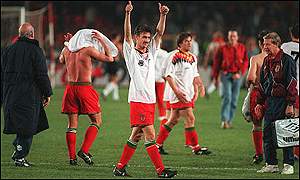
Ian Rush celebrating at the end of Wales' 1-0 win over World Champions Germany in 1991 - his second half goal proved decisive.
That’s the team then and now would be a good time to acknowledge players such as Paul Jones, Andy Melville, Brian Flynn, Robbie James, Mark Pembridge and John Hartson who just missed out on a nomination. The only thing remaining is to name the seven substitutes who would help to give this team the all round balance that even the best Welsh sides of my time have lacked;-
Wayne Hennessey.
Danny Gabbidon (cover for all defensive positions)
Terry Hennessey (cover for central defence and midfield)
Aaron Ramsey
Simon Davies
Ron Davies
Craig Bellamy

